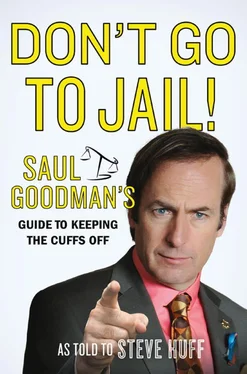What if we were to drop the word “snitch” for a moment and use another word—“whistle-blower?” Suddenly, it feels like a very different thing to do, doesn’t it? A noble thing!
Is it? Well, a guy named Ralph Nader made the word “whistle-blower” mainstream back in the 1970s because “snitch” and “informer” had begun to sound unappealing. All that civil unrest going down in the late sixties was way too interesting to the FBI, so old J. Edgar Hoover sent his crew-cut boys to find hippies and activists who could be turned stool pigeon. Nader used “whistle-blower” to reclaim the righteousness of telling the truth about wrongdoing, so no one would confuse that type of informant with your run-of-the-mill street-corner snitch.
Now that we’ve cleared that distinction up, let’s talk strategy.
Always Tell Your Attorney
An oldie but a goody. It may never be more important than when you’ve got the goods on someone or something—the “something” being some kind of organization. Because (and I know you knew I was going to mention it eventually) once we’ve established a paid relationship, we’ve got attorney-client privilege, and that is a beautiful, beautiful thing. As far as I’m concerned, that’s the relationship all those sweet sonnets are about.
Whatever your snitching situation, whenever it occurs, if you know it’s about legal wrongdoing, there’s a grand old reason to run it up the flagpole and let an attorney see if it’s going to flap in the breeze.
If it’s me looking at what kind of truth you have to drop, I want to work out the best strategy for Team You, every time. The stone cold facts are these—if you have something to tell that is definitely going to work in your favor, and shift the spotlight away from your own misdeeds, well, my friend, let’s pursue it. It’s like spilling your martini on a bartender right before directing his attention toward a giant tidal wave about to crash into the bar—yeah, what you did wasn’t cool, but he’s got bigger and wetter things to worry about now.
So what does whistle-blowing look like? Perhaps you and me, side by side, sipping vinegar-flavored coffee in a cramped room that smells like stale pastries and fear while we paint a verbal picture of what it is that you might know for the police or whomever the investigating body is. The attorney’s extremely important job here is to ensure that while you’re spilling the beans, you don’t do something that negates the goodwill that you’re building up with the boys in blue, like revealing that you’re complicit in another crime. Or that you have committed even more crimes than the cops were aware of in the first place. The point is: you might have a bargaining chip, so it’s your best move to let your attorney size that chip up before you play it. As similar as they might look, there’s a big difference between a $500 purple and a $1 blue. To keep you from getting screwed over, assume that your attorney is the only one in the room who isn’t color-blind and trust their instincts before betting too big.
If you’re in an interrogation room alone with an investigator, they might try and convince you it’s cool to talk to them, a friendly face, just to get everything out in the open. That guy or gal will definitely be trying to wring something incriminating out of you, no matter how much you think you’re buying yourself an invitation to the precinct’s annual holiday party.
An important thing to keep in mind when your personal B-29 bomber is carrying an explosive piece of intel? It’s possible the cops might already be in the know, especially if it involves a group of people. They’ll probably string you along anyway. It’s an investigative thing, and yes, they are totally allowed by law to do it.
So: rehearse with your attorney before you talk to anyone with a badge. “My roommate turned five people into hamburger macaroni for the bake sale and I said nothing because who wants to ruin a bake sale? Nobody!” Share the recipe with your attorney first. “My cellmate is the block enforcer and he’s having sex with all the guards who work third shift!” Let your attorney look through the peephole first. The same information a client is convinced is the hot ticket to save their ass—or at least get them a mattress pad with springs once they’re on the inside—could wind up making their defense strategy useless. Tell your lawyer the whole truth and nothing but the truth so that he or she can keep you from using that truth to incriminate yourself.
Always Tell Your Attorney, Part 2: Whistle-Blower Boogaloo
All whistle-blowing is snitching, but not all snitching is whistle-blowing.
Maybe if there is a real difference between the way people look at snitching now and the way it was perceived back in those happy, high times, it’s that “no snitching” has been kind of encoded into the criminal life, and it can feel singular, personal. There are some perfectly good reasons for that. Yes, it’s a mistrust of the police that stops people from coming forward, but it’s also a matter of self-preservation. Drop a dime on the guy you saw shoot up that bodega and you take one dude off the street, good for you—but if he’s in a gang, there’s a very real chance they won’t just put you in their crosshairs, but your whole family.
But whistle-blowing… there is a reason there are firms that specialize in that. Even if it was supposed to be just a more pleasant word for snitching, it’s taken on its own meaning. The right whistle-blower at the right time is a goddamned hero—and a hero is a dangerous thing to be.
I won’t try to pull too much history professor shit on you, but: when a lot of people think whistle-blower now, they think of Karen Silkwood.
Karen was a humble technician working at a nuclear power plant.
She noticed that there was a lot of slack bullshit afoot at the plant, lapses in health and safety protocols that could end up killing people who worked there. She decided to gather up all the evidence she could and deliver it not to a lawyer, but to a reporter for The New York Times . A few miles out from her rendezvous, Karen’s car left the road. It skidded a good distance before diving off an embankment. The packet she’d brought with her that was going to rip the lid off her employer’s dangerous issues? Mysteriously gone from her car and never recovered.
Whatever caused Karen Silkwood’s car crash, that “mysterious force” probably didn’t realize that her mission would end up making her a martyr not only to people who believe nuclear power is dangerous, but for people who want to call bullshit on nefarious organizations everywhere.
Silkwood-the-hero is an inspiration. Silkwood-the-deceased woman in an Oklahoma field is a cautionary tale. Cases like hers—and other famous cases, like the one that made Erin Brockovich a celebrity—have inspired some law firms to focus solely on representing folks who think there’s an alarm that needs to be sounded, and they’re the big red bell.
If you’ve got the goods on any kind of large organization or company—doesn’t matter if they’re privately owned or public—and you think you are exposing illegal, screwed-up actions, you’re a classic whistle-blower à la Silkwood. The good news is, you have something available she didn’t in the 1970s: law firms with the infrastructure to protect you.
That’s not to say any attorney worth a damn can’t handle a whistle-blower case. They can. But the bigger the organization you’re up against, the more attorneys you’ll probably need.
Example: you know for a fact that the crew of a local pawn shop moonlights building special novelty bongs for people addicted to anything they can turn into a vapor—and they also sell the soon-to-be-inhaled illegal goods themselves. If you report this one-stop shop, it’s a whistle-blowing moment.
Читать дальше












